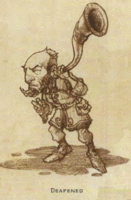Case Studies
Several authors have written about inaccessibility within TRPG rulebooks. Jones and Henry have examined Wizards of the Coast's Dungeons & Dragons and White Wolf's World of Darkness games in particular.
The Problem with Dungeons & Dragons
Jones analyzed rulebooks for the fifth edition of Dungeons & Dragons and discovered that the game materials have come a long way in providing positive representations of race, gender, sexuality, and socio-economic status.

In the 1970s and 1980s, Dungeons & Dragons rulebooks were commonly geared towards men, and women were rarely mentioned. The few women who were portrayed in rulebooks were overly sexualized and their roles were severely limited.
Women were featured more predominately in basic editions of the game, which consisted of simplified rules and limited character creation and advancement options.
Many editions of the game also feature undertones of racism.
- For instance, a player's choice of race greatly affects their capacity to excel at various aspects of gameplay and may also limit who a character can become in-game.
Character creation in game rulebooks often provides problematic attitudinal beliefs about others that "hint at bigotry and oppression within the game's history for different races" (Jones, 2017).
Inaccessibility in Dungeons & Dragons
Since the release of the fifth edition in 2014, the core rulebooks are beginning to depict more positive representations of racialized and female characters/non-player characters. Positive representations of people with disabilities, on the other hand, are still lagging and are highly stereotypical.
In Jones' analysis of Dungeons & Dragons rulebooks, she found several instances of problematic portrayals of people with disabilities.
Many in-game conditions, including blinded, deafened, charmed, paralyzed, poisoned, and prone, are treated as penalties to be cured, rather than a reflection of reality. The game strongly suggests that player characters are meant to be heroic and are physically and mentally fit to defeat enemies. This line of thinking perpetuates ableism, suggesting that only the strongest deserve to play and survive.

The imagery used in the Player's Handbook often portrays stereotypical examples of disability.
- An example of this imagery is a cliched image of an old man with a horn to his ear - he has been deafened, likely from old age. This imagery is troublesome as it perpetuates ableism and suggests that these types of conditions are "something to suffer from", "to be overcome or beat", and that "are a burden limiting ordinary life" (Jones, 2018).
Jones also points out that limited mechanics are available to players should they choose to play a character with a disability, or multiple disabilities.
Inaccessibility in World of Darkness RPGs
In Henry's writing, she compares and contrasts disability and accessibility within Changeling: The Dreaming and Vampire: The Masquerade from the World of Darkness setting.

In each game, players can choose to use "flaws", which include deafness, blindness, bad sight, and mental health conditions.
Players may opt to select "flaws" in "exchange for points that can be redeemed for abilities they want" which are usually positive, and are "related to driving, extra health, or attractiveness" (Henry, 2015).
Another problematic aspect of the "flaw" system is the often outdated, colloquial, and restrictive language used within rulebooks.
Henry (2015) also analyzed Apocalypse World and found that it listed disabilities as "debilities", which are defined as "permanent flaws to your character when they have sustained large amounts of damage". Apocalypse World does not allow players to play a character with a disability from the very beginning, which further regards disabilities as something bad that happens to a person.
The Takeaway
If game publishers do not provide adequate positive portrayals of disabilities in their games, then players with disabilities will have a hard time seeing themselves reflected in the material.
This becomes more problematic when disabilities are: broken down into point systems, reflected negatively, or stereotyped.
